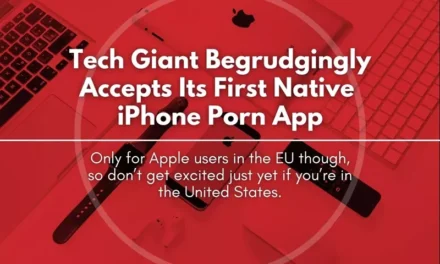
Wikipedia describes “OnlyFans” as “an internet content subscription service based in London, England.” The site hosts various content creators, such as physical fitness experts and musicians, but it is most known for being used by people who produce and post pornography (so-called “adult content”), often videos and images they make of themselves.
I mention this to explain a People headline that I feel compelled to address today: “OnlyFans Model, 20, Made $43 Million Last Year. To Her, It Doesn’t Conflict with Christian Values: ‘The Lord’s Very Forgiving.’” The subheading: “Sophie Rain grew up attending church every Sunday with her family in Tampa, Fla.”
The article reports that Sophie’s parents are “devout Christians” and that she “attended church with them every Sunday.” Then it states:
The latter quality hasn’t faded from the influencer’s life. Her Christianity remains a substantial part of her identity. She says she still checks in on her “home church” in Tampa when they stream online services. Looking at her life now, Rain doesn’t see any conflict between her work creating adult entertainment and her religious devotion.
She explains: “The Lord’s very forgiving, and he put me on here. He put me on earth for a reason and I’m just living every day. If this wasn’t meant for me, I wouldn’t be here right now.”
Six biblical facts
Let’s begin our response with six biblical and relevant facts:
- Lust is a sin: “All that is in the world—the desires of the flesh and the desires of the eyes and pride of life—is not from the Father but is from the world” (1 John 2:16).
- Enticing others to lust is, therefore, a sin as well: “Walk by the Spirit, and you will not gratify the desires of the flesh” (Galatians 5:16).
- Pornography is to be refused: “Put to death therefore what is earthly in you: sexual immorality, impurity, passion, evil desire, and covetousness, which is idolatry” (Colossians 3:5).
- God forgives our sins, but they must be confessed with a repentant heart: “If we confess our sins, he is faithful and just to forgive us our sins and to cleanse us from all unrighteousness” (1 John 1:9). As a result, “Whoever conceals his transgressions will not prosper, but he who confesses and forsakes them will obtain mercy” (Proverbs 28:13).
- Not all that happens in our lives is an expression of God’s best. To the contrary, we have freedom of will and can choose to sin (cf. Joshua 24:15).
- God does put us on earth “for a reason,” but that reason is to love our Lord and love our neighbor (Matthew 22:37–39) while walking in the Holy Spirit. Accordingly, we are taught to “cleanse ourselves from every defilement of body and spirit, bringing holiness to completion in the fear of God” (2 Corinthians 7:1).
It is clear that posting—or viewing—pornographic videos is sinful and thus not God’s will for any of us. However, I have a larger purpose in responding to the People article.
A tide that lowers all boats
The pendulum of culture is constantly swinging from one side to the other.
I remember a day when being a Christian meant obeying defined rules of behavior. The church in which I became a believer taught clearly that sex is only for marriage and that lust is wrong. We were discouraged from smoking, consuming alcohol, watching movies with adult themes, and even from dancing for fear it could lead to sin.
However, the sexual revolution born of postmodern relativism has become a tide that has lowered all boats.
Today, network television and popular culture are rife with couples who sleep together on their first date. LGBTQ activists have taught generations that “love is love.” I cannot scroll through my news feeds every day without needing to divert my eyes from ungodly images attached to articles. To say nothing of the plague of pornography that has consumed our culture, including many Christians, and the structural damage it is doing to our brains and relationships.
How are conservative Christians to balance what the Bible teaches and what the culture embraces?
One tragically flawed answer that the culture finds appealing involves a spiritual “solution” that Sophie Rain illustrates: sin, then trust God for forgiveness.
If I drive a nail into the wall
God promises that “if we confess our sins, he is faithful and just to forgive us our sins and to cleanse us from all unrighteousness” (1 John 1:9). His word assures us, “as far as the east is from the west, so far does he remove our transgressions from us” (Psalm 103:12). He will “cast all our sins into the depths of the sea” (Micah 7:19) and even promises to “remember [our] sin no more” (Jeremiah 31:34).
Of course, these promises require that we confess our sins with genuine repentance, something Sophie Rain does not seem to be doing. But when we do, we can then think that our sins are no longer relevant, that we can “sin and confess,” then “sin and confess.”
There are two massive problems with this scenario.
One: If we confess our sins without genuine contrition and a heartfelt desire not to repeat them, our confession is less than genuine.
I don’t mean that a litmus test must be passed here, and I readily acknowledge that many are repeat offenders of habitual sins (what the Puritans called “besetting sins”). But if our theology is simply that we can sin, confess, be forgiven, and then sin again, our hearts are far from the contrition that positions us to be forgiven and healed by God’s gracious Spirit.
Two: Even sin genuinely confessed and cleansed often leaves consequences that endure.
David’s confession regarding his sin with Bathsheba was so exemplary that it is recorded in Scripture (Psalm 51) as a model for the rest of us. However, the child of their adultery died, and David’s relationships with his family and nation were never the same again.
If I drive a nail into a wall and you remove the nail, the hole remains.
Many are living with the consequences of sins long ago confessed and forgiven by God. Broken marriages and criminal records are obvious examples, but so-called private sins can bring guilt and shame that persist long after the sin is confessed.
“If anyone’s work is burned up”
An often-overlooked example of the consequences of sin is lost reward in heaven. Scripture teaches:
No one can lay a foundation other than that which is laid, which is Jesus Christ. Now if anyone builds on the foundation with gold, silver, precious stones, wood, hay, straw—each one’s work will become manifest, for the Day will disclose it, because it will be revealed by fire, and the fire will test what sort of work each one has done. If the work that anyone has built on the foundation survives, he will receive a reward. If anyone’s work is burned up, he will suffer loss, though he himself will be saved, but only as through fire (1 Corinthians 3:11–15).
There are numerous heavenly rewards or “crowns” described in God’s word, including the “crown of righteousness” for those who are ready to meet the Lord (2 Timothy 4:8), the “crown of glory” for those who are faithful to their calling (1 Peter 5:4), and the “crown of life” for “the man who remains steadfast under trial” (James 1:12) and those who are “faithful until death” (Revelation 2:10).
When we choose to sin, even if we later repent of our sin and are cleansed from it, we forfeit the crown or reward we would have received if we had chosen obedience instead. This loss is eternal (1 Corinthians 3:15).
Five responses to temptation
How should we respond? Let’s close with five biblical steps.
One: Expect temptation.
The Enemy who tempted our Lord (Matthew 4:1–11) will tempt us as well. He “prowls around like a roaring lion, seeking someone to devour” (1 Peter 5:8). If David, whom the Lord described as “a man after my heart” (Acts 13:22), could fall into heinous sin, so can any of us.
Two: Turn immediately to God for victory.
Satan is better at tempting than we are at resisting. He knows those sins we can easily refuse and seldom wastes his time with them. As a result, the temptations we usually face are those we cannot defeat in our strength. However, the Enemy doesn’t want us to know this, so he often presents the sin in a guise that seems “small” or easily defeated, hoping to draw us into the battle apart from God’s strength. He slowly turns down the lights until our spiritual eyes adjust to the dark.
Here is where we need to claim the biblical promise: “God is faithful, and he will not let you be tempted beyond your ability, but with the temptation he will also provide the way of escape, that you may be able to endure it” (1 Corinthians 10:13).
There is no temptation your Lord cannot defeat, but we must seek his help before he can provide it. So develop the reflex of turning temptations immediately over to the Spirit. Pray for his help; follow Jesus’ model by responding with biblical truth; turn to fellow Christians for support
You cannot win this battle on your own, but you cannot lose it with God’s help.
Three: If you fall into sin, confess immediately with a repentant heart and claim the grace of God.
As I stated earlier, this is not the “cheap grace” that Bonhoeffer warned against, a kind of “easy believism” by which we sin and confess, then sin and confess. Genuine contrition and a desire to change are at the heart of biblical confession.
When we offer them, we can claim God’s promise to “forgive us our sins and to cleanse us from all unrighteousness” (1 John 1:9, my emphasis). Then, if guilt strikes you later, return to the moment when you confessed that sin and were forgiven for it and say to yourself, “Grace is greater than guilt.” You may have to do this repeatedly, but grace will inevitably win.
Four: If your sin has brought consequences in the lives of others, respond proactively and redemptively.
Zacchaeus modeled such a response when he experienced the forgiving grace of Jesus and immediately restored all he had defrauded “fourfold” (Luke 19:8). One of the Twelve Steps is to “make direct amends” to people we have harmed “except when to do so would injure them or others.”
Knowing that we will need to respond to the consequences of our sins can encourage us to refuse them before we commit them.
Five: Live every day ready to meet God.
Jesus taught us:
Stay dressed for action and keep your lamps burning, and be like men who are waiting for their master to come home from the wedding feast, so that they may open the door to him at once when he comes and knocks. Blessed are those servants whom the master finds awake when he comes (Luke 12:35–37).
The best way to live every day is to be ready to see the Lord that day. If you knew you would die next week or the Lord would return, what would you do differently today? Whom would you forgive? Whose forgiveness would you seek? What would you stop or start doing? Taking these steps is best for you and others, even if the Lord tarries for years to come.
We are one day closer to eternity than ever before.
The change that changes the world
I am convinced that one of the chief reasons the church is not impacting the culture more than we are is that the culture sees little difference between itself and the church.
If Christians can post pornographic videos while claiming that “the Lord’s very forgiving,” what’s to tell people that our faith changes our lives in any obvious way? If we think we can sin and confess, then sin and confess, why would we stop sinning? How could our example lead anyone else to our Lord?
By contrast, when we live biblically and act redemptively, others see the change they are created by God to desire for themselves. Their “God-shaped emptiness” draws them to the difference they find in us. Our lives align with our words, and our words speak and model the gospel in ways that change souls for eternity.
What is your next step into Christlike character today?
This post was originally published on this site be sure to check out more of their content.






